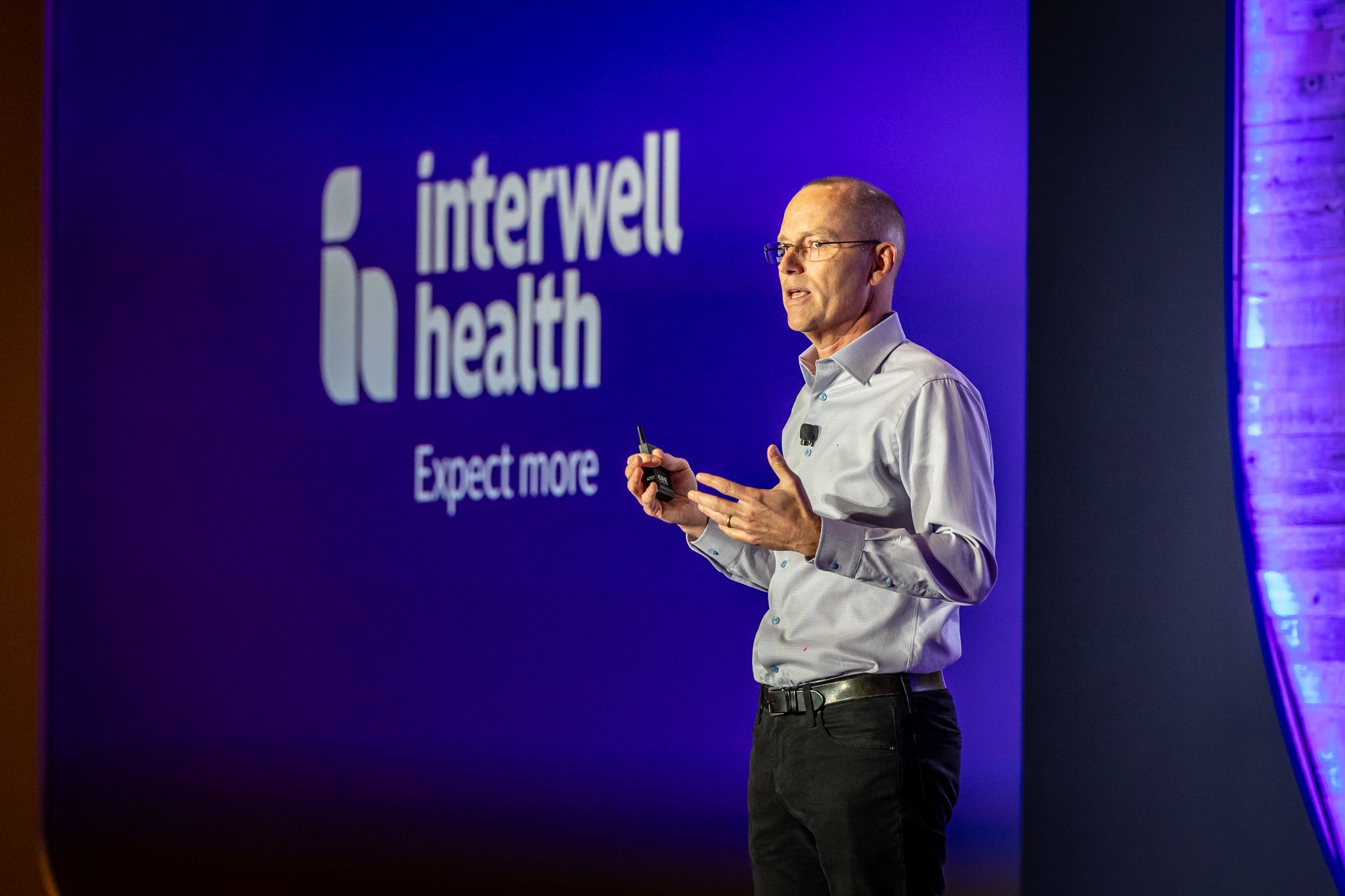Three Kidney Care Trends to Watch in 2025
At the third annual Partner Summit, nephrology experts, policymakers, and Interwell Health leaders shared their predictions for the future of kidney care, including continued growth of value-based models, an intensified focus on clinical documentation, and health equity remaining in the spotlight.
tags

When it comes to kidney care, 2024 was a big year. To name just a few milestones: surgeons performed the first ever xenotransplantation of a genetically modified pig kidney into a living person1, the Centers for Medicare & Medicaid Services (CMS) proposed and finalized the Increasing Organ Transplant Access (IOTA) payment model 2, and the Center for Medicare and Medicaid Innovation released positive results from the first year of the Kidney Care Choices (KCC) Model 3.
At the end of 2024, leading nephrologists and practice administrators from around the country gathered at Interwell’s annual Partner Summit in Dallas to discuss how advances in treatment and technology, evolving payment models, and other industry trends will impact nephrology practices. Throughout the event, three themes emerged as experts in the field shared their takes on what to expect in the world of kidney care in 2025 and beyond.
1. Value-based care models will continue to grow

With the introduction of the KCC Model in 2019, CMS sent a clear signal that the government wants more patients with kidney disease in value-based arrangements. The KCC Model performance period began in 2022, and in 2024 nephrology practices, policymakers, payers, and healthcare analysts finally got a look at first-year results showing the program is increasing home dialysis and optimal start rates, signaling there is a sustainable path ahead for value-based kidney care.
Increased utilization is also driving commercial payers’ interest in pay-for-performance models explained Stephanie Gutendorf, chief growth officer at Interwell, while moderating a physician perspectives panel at the event. “The industry has shifted more to focus on profitability, while at the same time there have been these extenuating circumstances in the market that have caused, for example, utilization to go up significantly,” said Gutendorf.
The physician panel included Dr. Charles Zachem, managing partner at Kidney Care of Oregon, and Dr. Carney Taylor, associate chief medical officer at Interwell, who both voiced optimism for the future of value-based kidney care. Dr. Zachem said he expects to see more regional health plans get involved in value-based contracts, but acknowledged it is a nascent industry and most kidney patients are still in fee-for-service arrangements today. He believes “we need to get to that right threshold of relevance across the board” so providers can commit to value-based care and fully embed it in their practices.
Proof point: Interwell’s Provider Network surpassed 2,000 nephrologists in 2024
The sustained growth of Interwell's Provider Network, along with the success of the practices within its network, reinforces experts’ predictions that value-based care models will continue to gain momentum. As Dr. Taylor highlighted during the panel, Interwell’s partner practices have achieved “incredibly impressive” growth and transformation. Dr. Taylor’s practice partnered with Interwell in a value-based care program to achieve some of the strongest outcomes in the country for measures including optimal starts, patient activation, and depression screening 4.
Interwell now has the largest network of aligned nephrologists in the country, and data to validate that it is also the highest performing nephrology network. As additional results from CMS and private health plans become available, they are demonstrating that “Interwell is stepping above and aside from the pack” asserted Gutendorf.
2. The focus on clinical documentation will intensify

As providers increasingly embrace value-based kidney care, they will need to focus on accurate, comprehensive clinical documentation to ensure resources are directed to the patients who need them most. On the second day of the summit, Naz Urooj, senior vice president of quality and clinical documentation at Interwell, led a spotlight discussion on clinical documentation. “Clinical documentation, risk adjustment, is a key lever for you to be successful in value-based care. As we continue to move into this journey, it becomes even more and more important that we accurately document our patients,” Urooj told the audience.
Most nephrologists are familiar with documenting their patients’ conditions from a renal perspective. But today, with many nephrologists essentially serving as the primary physician for their patients with complex, overlapping health issues, they must learn to document comorbidities beyond kidney disease to capture a complete picture of each patient.
The push for clinical documentation is driving advances in technology and AI
Clinical documentation was also a topic of conversation during the physician perspectives panel with Dr. Zachem and Dr. Taylor. As Dr. Taylor pointed out, the increased focus on clinical documentation threatens to contribute to providers’ already daunting administrative burden. The solution to this pain point, he said, is turning to advanced technology and artificial intelligence (AI) to ease the burden so providers can focus on patient care.
For Dr. Zachem, having access to the nephrology specific electronic health record (EHR) Acumen Epic Connect and the new Acumen Rounder application has helped the providers in his practice access the information they need for accurate clinical documentation. He predicts future innovations will make the technology even more useful. “Are there tools that down the road hopefully will be integrated into Acumen? Are there AI tools that will look at objective data and help pull it forward to show us potential diagnoses that are not being identified anywhere? Absolutely,” he said.
3. Health equity will remain in the spotlight

During his keynote address, Dr. Terry Ketchersid shared insights from his more than 30 years of experience in healthcare and recalled a time when health equity was considered “just a fad.” Fast forward to today, and both the government and private payers are actively driving health equity initiatives. Simply put, “it’s not going away,” said Dr. Ketchersid, who serves as senior vice president on the medical office leadership team at Interwell.
One of the highlights of the 2024 Partner Summit was a fireside chat on health equity with Dr. Felicia Speed, vice president of social work services at Fresenius Medical Care, and Purva Rawal, chief strategy officer for the Center for Medicare and Medicaid Innovation (CMMI). Rawal explained how value-based care can serve as a mechanism to help address disparities and how CMMI is working to design for equity first by innovating payment models, driving screening for health-related social needs, and working to increase participation among safety net providers. “We can’t improve quality, we cannot close disparities, without a focus on equity through all of the work we’re doing,” she said.
While healthcare and social determinants of health (SDoH) disparities have gained attention over the last several decades, Dr. Speed said nephrology clinical teams are just beginning to wrap their minds around the concepts. She believes providers are hopeful about having another lens into patients’ health, yet they will need to pause and process how they can address social complexities in already complex patients.
The first step to addressing health equity is identifying areas of need
Dr. Speed recognized that providers face a challenge: patients want to know why they are being asked social needs questions when solutions to help them access services such as secure housing and transportation may not yet exist. She offered practical advice, suggesting providers educate patients on SDoH data collection as an important first step to identify areas that need dedicated programs.
One of the most meaningful ways kidney care teams can start to address healthcare inequities is by working with their own patients to improve their health literacy, said Dr. Speed. She noted that health literacy impacts both hospitalization rates and mortality, yet it is often overlooked. She encourages providers to slow down, take the time to do teach back, and ensure patients are engaged and truly understand their health. In addition, Dr. Speed called out the importance of recognizing patients’ cultures and access to food in their own communities.
“We need to continue to do more for patients”

When Interwell CEO Robert Sepucha took the stage, he shared that moving forward he anticipates a continued focus on the two primary levers for improving patient outcomes: reducing hospitalizations and readmissions. But we can’t stop there; we also need to work on improving optimal starts and preemptive transplant rates, increasing cost savings for CKD and end-stage kidney disease (ESKD) patient populations, and supporting patients who lack access to high-quality nephrology care.
Sepucha closed the 2024 Partner Summit with a simple and clear vision for the future: “We’ve got this strong foundation of success, but there’s more that we need to do. We need to continue to do more for patients.”
References
- CNN: Pig kidney transplanted into living person for first time. https://www.cnn.com/2024/03/21/health/pig-kidney-transplant-living-person/index.html
- CMS: Biden-Harris Administration Finalizes New Model to Improve Access to Kidney Transplants. https://www.cms.gov/newsroom/press-releases/biden-harris-administration-finalizes-new-model-improve-access-kidney-transplants
- Center for Medicare and Medicaid Innovation: 2024 Report to Congress. https://www.cms.gov/priorities/innovation/data-and-reports/2024/rtc-2024#xd_co_f=NmRiYzUxNWItMmE4OC00Y2FiLWE4OTItMzhhNTI3YzYyNmFl~
- Healio: Kidney Care Choices model shows promise for future of value-based care. https://www.healio.com/news/nephrology/20241213/kidney-care-choices-model-shows-promise-for-future-of-valuebased-care